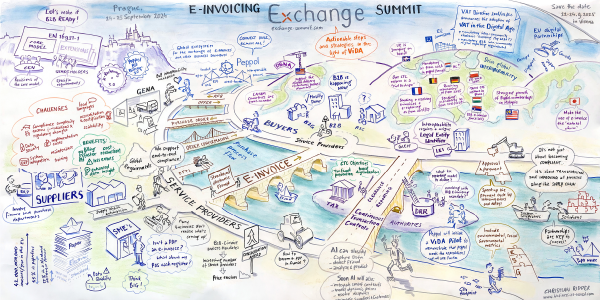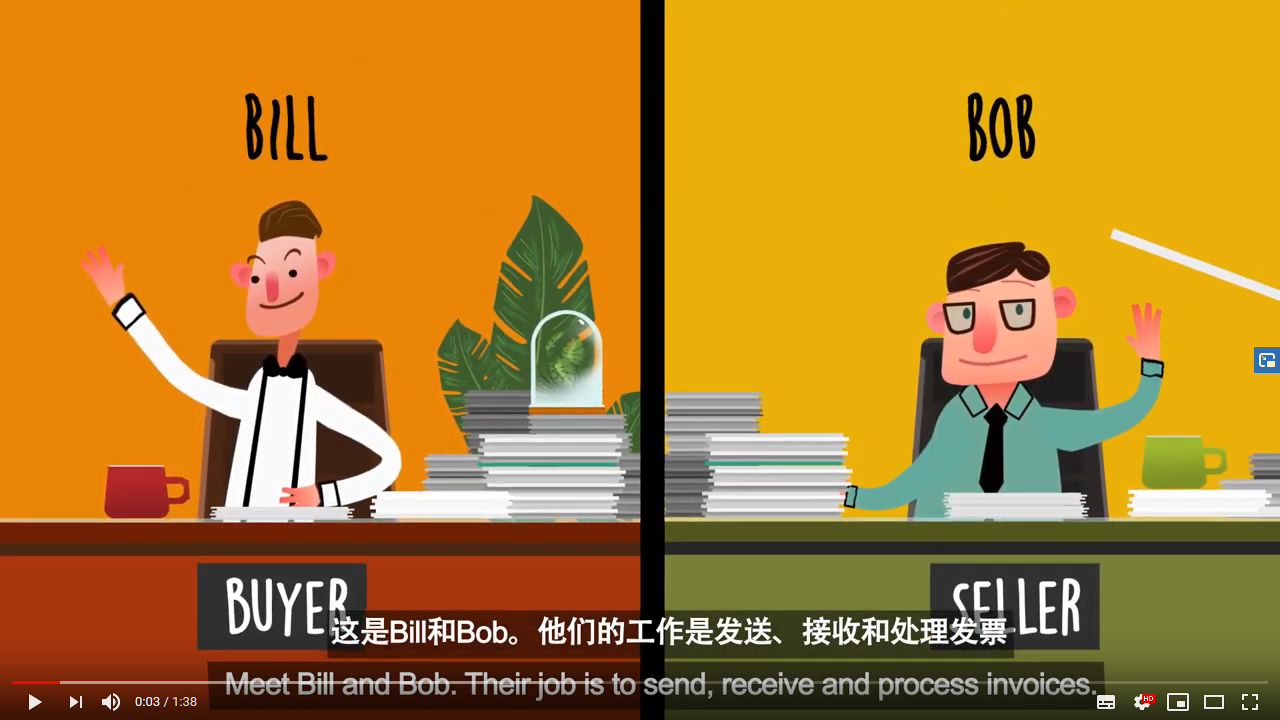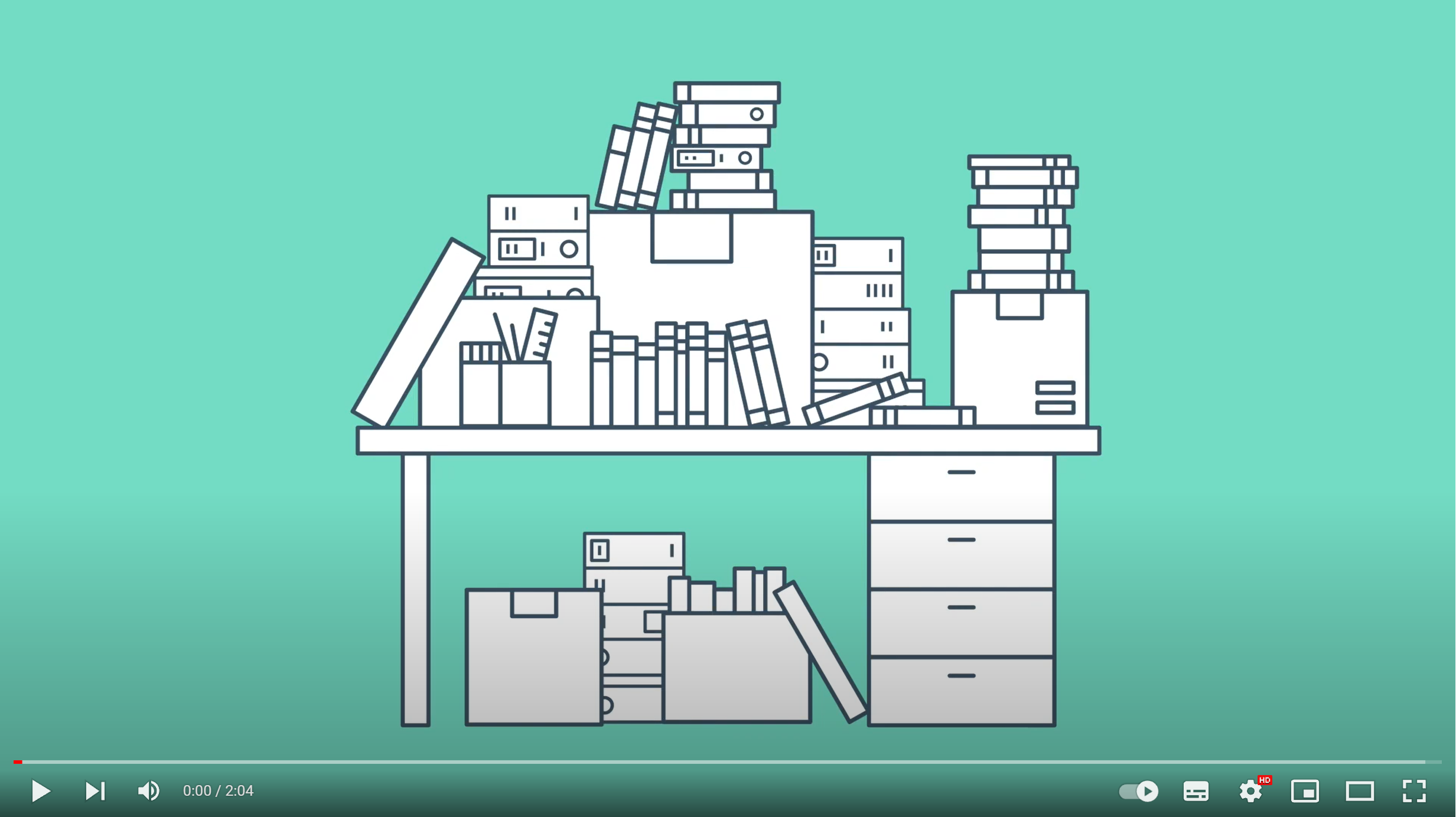E-Invoicing Exchange Summit: Virtual Events
We are glad to offer you this series of virtual events. These will keep you up to date with the latest developments in the field of E-Invoicing and help you to make the best out of the waiting time until your personal participation at the upcoming E-Invoicing Exchange Summits. Here you find useful tips for participants and speakers how to create a successful virtual event experience.


Stay informed to the latest updates with our newsletter!
Do you miss a specific topic or want to suggest an expert as speaker?
Are you interested in contributing a topic by yourself?
You are registered but have not received information on how to access the session?
Get in touch with us here or send a message via LinkedIn.
Recorded Sessions
MAY 27, 2021
Watch Recording
Paper? PDF? What to do when your partners have yet to adopt E-Invoicing
Despite the advancements in technology and growing momentum of E-Invoicing’s global adoption, the United States has yet to join the movement. The lack of commitment in the US can be partially attributed to the absence of government mandates and, in turn, the lack of interoperability. This creates an environment where certain companies have embraced and implemented e-Invoicing while their partners are sticking to paper and PDF.
+ How paper invoices can be supported with the use of OCR (OCR with AI/ML capabilities)
+ How PDF invoices can be automated with the use of OCR
+ How pure E-Invoicing will be deployed for suppliers who are open for such format
+ Finding a comprehensive solution that can manage different invoicing streams
Tomasz Spluszka Consulting Director E-Invoicing, Comarch, USA

The Future of Procurement: How Digital is Reshaping P2P
+ What is digital and is it real?
+ What impact is digital having on P2P?
+ What should we be doing about this digital disruption?
+ How do you start your digital journey?
Dr. Elouise Epstein Vice President, A.T. Kearny, USA

April 22, 2021
Watch Recording
Peppol: E-Invoicing and beyond
The adoption of Peppol around the world continues to increase as more countries recognise the unique approach that benefits all stakeholders - governments, businesses and service providers.
We will start with a 30 minute introduction session for delegates that are new to Peppol or needing to update their knowledge.
Delegates with a good understanding of Peppol can optionally join after the introductory session to hear about the latest developments in Peppol.
+ A beginners guide to Peppol
+ How to get started with Peppol
+ Peppol CTC
+ Latest news from Peppol
- Hear about market developments around the world
- Global interoperability through the Peppol International Invoice
- Strengthening Peppol through updated agreements and policies
+ Question and answer session
André Hoddevik Secretary General, OpenPeppol
Steve Graham Market Development Lead, OpenPeppol


April 13, 2021
WATCH RECORDING
Use case ENEL Group: How vendor proactivity and process augmentation can boost the Accounts Payable Invoice Automation
The invoice as an engine of value: a real multi-country experience
+ E-Invoicing
+ ERP integration
+ Vendor Proactivity
+ Zero-Touch rate
+ Multi-Country
+ Collaborative Workflow
Vincenzo Cocciolo Partner & Technical Director DocFlow
Fabio Omar El Ariny Partner DocFlow


Have you heard about GAIA-X? Learn about the potential to optimize Purchase-to-Pay and the way we share data with business partners, and how E-Invoicing could benefit in the future
+ Principles of GAIA-X
+ DAISY concept as a concrete adoption of GAIA-X principles for the manufacturing industry
+ Potential for E-Invoicing
Markus Quicken CEO SupplyOn and Day 1 member of GAIA-X

As identity takes center stage: value of the Digital Identity in customer due diligence and paperless business transactions
+ Overview of the Global LEI System
+ Banking, Supply-chain and Internet: one need for identity
+ LEI and Digital Identity: the E-Invoicing use cases
Stephan Wolf CEO Global Legal Entity Identifier Foundation (GLEIF)

March 24, 2021
Watch Recording
E-Invoicing country updates from Poland, Egypt and France: New regulations and principles on implementation from a business perspective
+ Mandatory E-Invoicing in Poland (KSeF) starting October 2021
+ Egypt E-Invoicing: Are you ready for the next wave?
+ Long awaited E-Invoicing model in France: Latest developments and first learning experiences from the pilot
+ How E-Invoicing and real time reporting should look like - a businesss perspective based on these country experiences
Luc Dhont and Jurgen Jaffre Global Indirect Taxes, Procter & Gamble
Bruno Saurel Chairman, INFOCERT - technical secretary of AFNOR Certification and specialist in software certification
Ridvan Yigit Partner & CCO, SNI




March 23, 2021
Watch recording
The Design of a Global Interoperability Framework
Learn and discuss how to build on the various successful regional and national initiatives and models for interoperability to create a truly global approach.
+ Overview of GIF Components
+ Managing diversity and commonality - where are the pressure points?
+ What is working consistently and why?
+ Is there a recognisable standards 'stack' that could underpin a global approach?
+ Technical report on the EESPA GIF Pilot
+ Bridging document standards used by industry and public sector: ANSI, EDIFACT, UBL, UN/CEFACT SCRDM and European Norm?
+ How to reconcile different business, fiscal and legal models?
+ What is the future of interoperability between GIF Instances
+ Regional Interest in GIF Implementation
Chris Welsh Chair, Global Interoperability Framework Workgroup and Board Member, ConnectONCE, USA
Michel Gilis Chair of Interoperability, EESPA, Belgium


March 16, 2021
Watch recording
Recent developments in Supply Chain Finance and how it relates to E-Invoicing

Supply Chain Finance is one of the fastest growing products in the Trade Tinance space. However, corporates and their service providers often do not use similar terminology or accounting techniques. The Global Supply Chain Finance Forum – comprised of Bankers Association for Finance & Trade (BAFT), Euro Banking Association (EBA), Factors Chain International (FCI), International Chamber of Commerce (ICC), and International Trade and Forfaiting Association (ITFA) – intends to provide clarity and consistency to the world of supply chain finance and supports an industry-wide, uniform adoption of the GSCFF industry definitions. When all parties use similar techniques and terminology, it makes for a more streamlined and efficient process that can also be supported by electronic invoicing processes and ultimately foster business growth.
+ Overview on SCF and how it relates to E-Invoicing
+ SCF market status in Europe and globally
+ Measuring the market size
+ Progress report on recent GSCFF activities
+SCF in the view of corporate accounting
Christian Hausherr Chair of the Global Supply Chain Finance Forum
Opportunities for Collaboration between E-Invoicing service providers and SCF providers

+ Key benefits of e-invoicing for SCF operations
+ Potential cooperation models between e-invoicing service providers and SCF providers:
- e-invoicing service providers in an activator role
- e-invoicing service providers in an enabler role
+ Appetite from the e-invoicing Service Providers community to collaborate with SCF providers: Highlights of two EESPA member surveys
Erik Timmermans Senior Executive Advisor at EESPA and Founder of WOA (World of Open Account)
March 11, 2021
Watch recording
Developing an E-Invoice Exchange Framework for the U.S. – Update from the Business Payments Coalition

The Business Payments Coalition made significant progress in 2020 towards developing the standards for a e-Invoice Exchange Framework for the U.S. This session will touch on the progress made to date and look towards the future as they are preparing for an in-market pilot in 2022.
Todd Albers Sr. Payments Consultant Payments, Standards and Outreach Group, Federal Reserve Bank of Minneapolis, USA
How to accelerate end user adoption of E-Invoicing?

+ End-user Adoption
+ Market Development
+ Vision for the Future
+ Concrete Benefits
+ E-Invoice Readiness
+ Accelerating the Adoption
Anna Tujunen Active member of the Business Payments Coalition (BPC) and CPO at Dooap, USA
March 10, 2021
Watch recording
E-Invoicing, CTC and Government: Far beyond taxes

+ A brief world panorama on the status of Continuous Transaction Controls (CTC)
+ Continuous Transaction Controls and the content of E-Invoices
+ Experiences of uses of E-Invoicing information in Latin America outside tax administrations
Vinicius Pimentel de Freitas Head International E-Invoice Coordination Interamerican Centre of Tax Administrations, Brasil
E-Invoicing in Costa Rica and Guatemala: Status quo and next steps

In Central America we had E-Invoices in Costa Rica and in Guatemala. While Costa Rica has the obligation since September 2018 with public administration being ready to accept and process E-Invoices, Guatemala has been working in several forms of no mandatory E-Invoicing since 2007. There, the major change came in 2019 with the final version of the process.
During this presentation you will learn how Walmart has implemented both processes, the challenges they were facing and how they accomplished these challenges.
Carolina Jimenez Portfolio and Senior Project Manager Central America, Walmart
Paola Chavarria Accounts Payable & Taxes Regional Service Senior Manager, Walmart
January 21, 2021
Watch recording
Digitalisiertes Steuerreporting: Aktuelle Trends und Tools
Vision TaxTech
Tax Technologie ist in aller Munde. Big Tax Data, Tax Analytics, Blockchain oder Künstliche Intelligenz sollen die Steuerwelt von morgen verändern. Big Data-Analytics, spezielle Cloud-Anwendungen oder KI-Tools schaffen dabei bislang ungeahnte Möglichkeiten für die Gestaltung von Prozessen in der Steuerabteilung der Zukunft. Doch was bedeuten diese Schlagworte in der konkreten Umsetzung, wie könnte die Steuerabteilung von morgen davon profitieren und welche Lösungen existieren am Markt?
Stefan Groß Partner, Peters, Schönberger & Partner

TaxVoice User-Group rund um digitales Steuerreporting für multinationale Unternehmen und Shared Service Center
+ Welche frei verfügbaren Veröffentlichungen bieten einen guten Überblick über die neuesten Entwicklungen im Bereich Steuerreporting und elektronische Rechnungsstellung in Europa?
+ Wie organisieren wir eine effiziente Zusammenarbeit zwischen dem internationalen HQ und Landesorganisationen sowie zwischen den jeweils beteiligten Fach- und IT-Bereichen?
+ Welche Know-how Profile brauchen wir, wie bilden wir aus und an welchen Universitäten in Deutschland finden wir gute Kandidaten?
+ Mit welchen Softwarelösungen / Datenformaten erreicht man eine effiziente Verknüpfung von Steuer-Reporting (B2T) und elektronischem Datenaustausch (B2B)?
Alexander Kollmann Project-Manager Tax-Technology, Schwarz Dienstleistung (Lidl, Kaufland)
Colin Blöcher Global IT-Manager, Loh Services GmbH & Co. KG


Digitalisierung der Umsatzsteuer: Möglichkeiten einer Übertragbarkeit des Clearance Modells auf Deutschland
Ivo Moszynski Mitglied des Vorstandes, Verband elektronische Rechnung (VeR)

November 11, 2020
Watch recording
Discover New Developments in Peppol
+ A Peppol refresher - what it is and how to join
+ Implementing the Global Interoperability Model
+ The Peppol International Invoice project
+ Implementing CTC through Peppol
+ Market developments from Peppol stakeholders
+ Question and answer session
André Hoddevik Secretary General, OpenPeppol AISBL, Belgium

NOVember 4, 2020
Watch recording
E-Invoicing in Greece and France
E-Invoicing in France
+ Current status of B2G E-Invoicing in France with Chorus Pro
+ Update on the French plans to make B2B E-Invoicing mandatory by 2025
+ Reliable Audit Trails in France
Lucien Gimenez Trainer and Expert in Audit and E-Invoicing, France

E-Invoicing in Greece
In this session you will learn how to be legally compliant with the AADE in Greece and how to stay ahead of tax, regulatory, and compliance requirements with SAP Document Compliance for Greece.
Governmental regulation is an increasing factor in business today. In the past years, we have seen a significant increase in the number of laws and changes issued in the more than 90 countries that SAP actively monitors. This surge in regulation has surpassed the ability of most companies to comply with the tax regulations.
Lilian Tagawa Localization Product Manager, SAP and
Prateek Tripathi Chief Product Owner and Development Manager, SAP


October 22, 2020
Watch recording
E-Invoicing in Italy and Switzerland
E-Invoicing in Switzerland
+ Legal framework
+ Strong role of Service Providers
+ Retail and Healthcare sector as specialty + swissDIGIN as a national multi-stakeholder forum
+ eBill in the B2C area
+ New opportunities with QR-bill
+ Invoicing to the federal administration
Simon Zbinden Standards Expert E-Invoicing, GS1 Switzerland, Head of swissDIGIN, Switzerland

Live Demo of New Products for Swiss SME
+ Swiss requirements like eBill and QR Code included
+ Based on a modern and secure platform in Switzerland
+ Access to international networks and clearance systems, incl. Italy
Marcus Laube CEO Crossinx

Almost 2 Years of E-Invoicing Mandate in Italy
+ What are the official statistics and the lessons learnt?
+ What adjustments have been made so far?
+ What are the next steps?
Mario Carmelo Piancaldini Revenue Agency, Italy

Worldwide Approach to E-Invoicing Starting from Italian Best Practice
+ Italian E-Invoice: results, benefits, best practice and improvements
+ Italian landscape: not only E-Invoice
+ How to move from local to global optimizing the investments
Enrico Liverani Co-Founder, Digitechs, Italy

October 20, 2020
Watch recording
Digitizing the Procure-to-Pay (P2P) Process – Your Roadmap for Transformation and Financial Statement Accuracy
The P2P process is no longer viewed as a “back-office” function but one of tremendous value providing opportunities for strategic sourcing, automation, improved controls, and business partnerships which can greatly reduce risk and improve working capital. The P2P process is evolving from a series of isolated functions to a single process in which purchasing and accounts payable processes are automated. The P2P process can provide analytical functions, visibility to cash flow that adds new value to the organization. This evolution aligns with the needs and goals of organizations to reduce costs, streamline the financial close, improve controls and realize productivity increases.
What You Will Learn and Key Takeaways
+ Learn where to start and how to begin your digitization journey through the presentation of a detailed roadmap.
+ Identify the challenges in your P2P process and determine the automation solution that will help to close your process gaps.
+ What are the drivers for change to move the P2P process to a single automated solution?
+ Get a detailed look at the definitions, technological trends and case studies for a digital P2P transformation
+ Learn How to Reduce P2P Process Complexity and Risk
+ Develop a Shared Vision for Transformation
+ You will learn from best practices for the financial close and how digitized P2P processes can help to ensure a streamlined financial close and timely and accurate reporting results.
Chris Doxey President, Doxey Inc, USA
October 15, 2020
Watch recording
Practice Principles of Continuous Transaction Controls (CTCs)
Invoicing in the Digital Age - A Global Update
+ Global overview of recent and future trends and requirements on e-invoicing, e-reporting and on request e-audit requirements
+ Country updates (India, China, Greece, Middle East and Poland) facilitated by a Q&A session with an international panel of experts
+ Digital tax compliance and exchange of information
+ How these recent trends interact with a company's broader AP/AR process
Christoph Zenner Partner, PwC, Belgium
Ellen Cortvriend Director, PwC, Belgium


CTC - Powered by Peppol: Addressing the Needs of Tax Authorities
The Peppol Network already provides interoperability for eInvoicing in more than 30 countries, providing a pre-existing foundation for tax administrations to establish CTC.
Learn about how each of the existing CTC models can benefit from the Peppol approach and discover how a model of 'delegated clearance/regulated distribution’ may be the optimal solution to meet the shared needs of both tax administrations and businesses.
+ The interoperability challenge in Europe and globally
+ CTC business models and requirements
+ A comparative analysis of CTC models and implementations
+ The distribution challenge
+ The 'delegated clearance/regulated distribution' model
André Hoddevik Secretary General, OpenPeppol, Belgium
Steve Graham Business Development Lead, OpenPeppol, Belgium
Nazar Paradivskyy VP Regulatory Affairs, Pagero Sweden



October 13, 2020
Watch recording
The Design of a Global Interoperability Framework
This session brings together a panel of thought leaders to discuss how to build on the various successful regional and national initiatives and models for interoperability to create a truly global approach.
Questions to be discussed
+ Managing diversity and commonality - where are the pressure points?
+ What is working consistently and why?
+ Is there a recognisable standards 'stack' that could underpin a global approach?
+ Bridging document standards used by industry and public sector: ANSI, EDIFACT, UBL, UN/CEFACT SCRDM and European Norm?
+ How to reconcile different business, fiscal and legal models?
Chris Welsh Chair, Global Interoperability Framework Workgroup
André Hoddevik Secretary General, OpenPeppol
Todd Albers Sr. Payments Consultant Payments, Standards and Outreach Group, Federal Reserve Bank of Minneapolis
Michel Gilis Chair of Interoperability, EESPA
Tim Cole Former Chair of Interoperability, EESPA
Cyrille Sautereau President, French E-Invoicing Forum
Moderator: Charles Bryant Secretary General, EESPA







October 07, 2020
Watch recording
E-Invoicing in Germany and Belgium
E-Invoicing in Germany: Status Quo and Next Steps
In Germany an important milestone is reached: Since November 2019, the public administration is ready to accept and process E-Invoices. The highest federal authorities, constitutional bodies and other authorities of the federal administration have succesfully implemented two web-based platforms, which receive E-Invoices by various channels like e-mail, upload, transmission via webservice or Peppol. In 2020, there is on one hand intensive work on improving the platforms with regard to usability. And on the other hand, federal administration informs invoicing parties about the obligation to send E-Invoices from November 27th on. You will learn more why the obligation to send E-Invoices is a chance for the digitization of accounting in business.
Furthermore, you will learn why E-Invoicing is only the beginning of E-Procurement and what the recent VeR study recommends regarding making E-Invoicing fully mandatory and implementing an Italy-like clearance system in Germany.
Franziska Streichsbier Federal Ministry of the Interior, Building and Community
Anna Dopatka Coordination Office for IT-Standards (KoSIT)
Ivo Moszynski Forum for Electronic Invoicing, Germany



Insights Into the Ambitious Flemish E-Invoicing Project
The Flemish Authorities are receiving over 73% of all their invoices as XML-invoices (European norm) by making it mandatory for the suppliers. The goal is to achieve 80% by the end of 2020. The double impact of this ambitious Flemish E-Invoicing project:
+ Bringing the B2B uptake in Belgium from 8% to 15%
+ Changing the Flemish authorities' late payment pattern into an early one
Johan Van Steelandt Flemish Authorities, Belgium
Lien Wauters - Van der Taelen Flemish Authorities, Belgium


September 30, 2020
Watch recording
So meistern Unternehmen die steigenden Compliance- und Reporting-Anforderungen erfolgreich: Ein Experten-Update rund um E-Rechnung, Berichtspflichten in Echtzeit und Erstellung von E-Audit-Dateien
+ Vorstellung des aktuellen europäischen Rechtsumfelds und Ausblick auf die zukünftige Entwicklung durch PwC
+ Die Zusammenarbeit zwischen PwC und Coupa im Überblick
+ Die Bedeutung der Berücksichtigung von Compliance bei der Planung und Durchführung eines P2P Projektes am Beispiel von Procter und Gamble
+ Der Coupa-Ansatz zum Thema Globale Compliance
+ Live-Demo der Coupa-Lösung
Ellen Cortvriend Director, PwC
Christoph Zenner EMEA Indirect Tax Leader, PwC
Nico Bac Founder, Digital Procurement Now
Jean-Marc Quenet Regional Lead - Value Solutions Consulting, Coupa
Markus Hornburg VP, Global Product Compliance, Coupa





September 29, 2020
Watch recording
Opportunities, Challenges and Implications for the E-Invoicing Industry
EESPA sets the scene for the E-Invoicing journey at this crucial moment:
+ Industry leadership and momentum
+ E-Invoicing as the catalyst for full supply chain automation and new financing models
+ Building the interoperable eco-system in Europe and globally
+ Regulatory and compliance challenges and managing Continuous Transaction Controls
+ The market outlook, key next steps and SME adoption
Marcus Laube Co-Chair, EESPA
Gary Benson Executive Committee Member, EESPA
Ahti Allikas Executive Committee Member, EESPA
Christiaan van der Valk Executive Committee Member, EESPA













